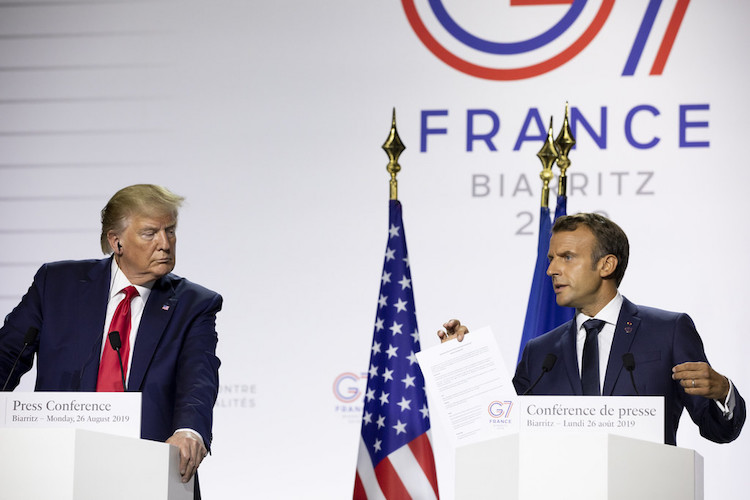Viewpoint by Daryl G. Kimball and Julia Masterson
The following are extensive extracts from an that analysis first appeared on the website of Arms Control Association (ACA) on September 24. Daryl G. Kimball is ACA Executive Director and Julia Masterson research assistant.
WASHINGTON, DC (IDN | Arms Control Association) – The latest attempt by European powers to salvage the 2015 Iran nuclear deal hit a roadblock this month when the Trump Administration hesitated to engage in a French-sponsored initiative. In August, French President Emmanuel Macron offered a proposal before world leaders at the G-7 summit in Biarritz, France for a $15 billion line of credit to Tehran in exchange for its full compliance with the Joint Comprehensive Plan of Action (JCPOA).
According to the plan, the $15 billion credit line would be guaranteed by Iranian oil and would help compensate Tehran for revenue lost through the reimposition of U.S. sanctions, which began after Washington unilaterally withdrew from the JCPOA in May 2018.
In May 2019, the Trump Administration announced it would not renew the sanctions waivers previously granted to countries importing Iranian oil in what it described as a new approach intended to pressure Iran to give up its uranium enrichment program altogether, curb its missile program, halt its support for proxy forces in the region, and make fundamental changes to its political system.
For now, the success of Macron’s initiative, or a variation of it, appears to hinge on whether the Trump Administration will agree to waive sanctions on the relevant oil transfers. So far, U.S. officials are suggesting they won’t.
The State Department’s coordinator on Iran, Brian Hook, told reporters on September 4 that “We can’t make it any more clear that we are committed to this campaign of maximum pressure and we are not looking to grant any exemptions or waivers.”
Without the reissuance of the necessary waivers, France and other countries would likely be unwilling to go forward and risk U.S. Treasury Department enforcement of secondary sanctions on their own institutions. Trump’s approval would not necessarily require U.S. decision to rejoin the JCPOA, but it would allow the other five parties to uphold their obligations under the agreement and under UN Security Council Resolution 2231, which endorses the agreement.
Following the U.S. rebuff of the Macron proposal, Iranian President Hassan Rouhani declared on Sept. 4 that the Islamic Republic would no longer adhere to the limits on uranium centrifuge research and development set by the 2015 Iran nuclear deal, which is its third step away from compliance with the JCPOA in retaliation for the reimposition of U.S. sanctions.
Iran’s announcement that it will ignore centrifuge research and development limits follows its May and July 2019 decisions to exceed caps on uranium stockpile size and uranium enrichment levels.
Iran’s moves are worrisome breaches of the JCPOA, but they are relatively modest and are quickly reversible, and the IAEA confirms Iran is still meeting other JCPOA obligations. This strongly suggests that Iran is not racing to amass weapons-grade nuclear material but is trying to pressure the remaining parties to the JCPOA to deliver the benefits Iran was promised when it agreed to and implemented the multilateral nuclear deal.
On September 4, Iranian state TV reported Iranian President Hassan Rouhani as saying: “I think it is unlikely that we will reach a result with Europe by today or tomorrow. Europe will have another two-month to fulfill its commitments” or else Iran would take further retaliatory steps.
Complicating matters further, the September 14 drone and cruise missile attack on a major Saudi Arabian Oil Co. (Saudi Aramco) oil refinery in eastern Saudi Arabia has increased tensions and, for now, led the Trump administration to double-down on its “maximum pressure” sanctions campaign against Iran. The attack has also diverted European diplomatic efforts away from saving the JCPOA to reducing regional tensions.
Even after the attack on the Saudi Aramco facility, U.S. Secretary of State Mike Pompeo (who has insisted that Iran must take action in 12 key areas before there will be sanctions relief) has said Trump would be willing to meet “with no preconditions” with Iran’s President Hassan Rouhani on the margins of the UN gathering.
Iranian officials have ruled out any such meeting. “No such thing will happen” until the United States “stops economic terrorism and returns to the nuclear deal,” Seyed Abbas Mousavi, a spokesman for the Iranian Foreign Ministry, said Sept. 16.
On September 23, France, Germany and the United Kingdom issued a joint statement that condemns the attack and accused Iran as responsible. The E3 urged de-escalation, including a “political solution to ongoing conflict in Yemen,” and expressed “continued commitment to the JCPOA.” They urged Iran to return to compliance with the nuclear deal and to agree to negotiations “on a long-term framework for its nuclear program” and other regional security issues.
For now, it appears the tit-for-tat spiral of escalation will continue until and unless there is a viable, new diplomatic off-ramp. [IDN-InDepthNews – 27 September 2019]
Photo: U.S. President Donald Trump and French President Emmanuel Macron at a joint press conference at the G7 summit in Biarritz, France. Credit: G7 France,




